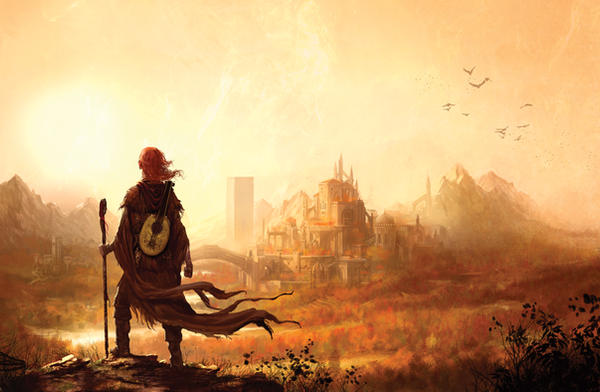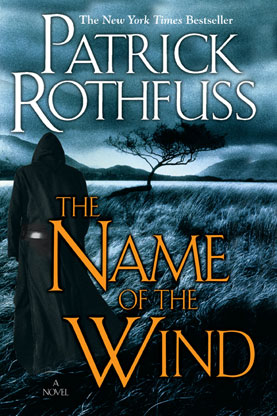No matter how I write this review, it will fail the book in some way. Patrick Rothfuss has written a wonderful adventure, epic in scope, and eloquent in its delivery. I don’t just mean the prose, but the story’s voice and setting too. And world building. Yeah, that was fabulous as well. The Name of the Wind is one of those novels that delivers everything to you subtly. It’s one of those books that you have to read more than once just to make sure you caught everything, or to validate that you connected things correctly. There are hints, and twists, and turns salt and peppered throughout the book. Some are more obvious than others. This story is really the beginning of a chronicle regarding a young, red-headed and green- eyed prodigy that we first meet as a tired innkeeper, hiding behind his bar from his adventurous past and the enemies he made. In his glory days, he was the stuff of legend. He went by many names: Kvothe the Kingkiller, Kvothe The Bloodless, and Kvothe the Arcane, among many others. Some of the titles were accurate, and others were a mere shadow of the truth. It’s the notion of Kvothe’s legend that brings dark forces to Kote’s neck of the woods. Kote is the name Kvothe goes by at this time in the story, his time as the innkeeper, as he would rather remain inconspicuous. Unsurprisingly, however, the evil from his past finds him anyway. Strange, spider-like creatures, metallic and demonic, we come to know as Scraels began to turn up in the land. Kote set out on a mini-adventure at the beginning of the book, and slayed a score of them. In this process he saved a traveler known as Chronicler, who had been known to travel the four corners  of civilization to log the legends and stories of his day. This is when the book really takes off, and takes its true form. Chronicler, an accomplished scrivener, convinced Kote to share the legend of Kvothe, and to awaken those powerful memories from his past. He wanted the true story. Kote finally agreed. He sat down with Bast, his closest servant and friend, and Chronicler to tell the tale. Kvothe started near the beginning, and Chronicler jotted down his words. As a youth, Kvothe belonged to a talented traveling group called the Edema Rue. They were artists — storytellers, singers, and entertainers. They shared their talents and spun their tales as they laughed and sang, and captivated the locals with whom they came into contact. Their songs were powerful stories that caused grown men to weep, and young women to swoon. As the story progresses, an old sage type character joined the band of travelers, and he took note of Kvothe, and became his mentor. At one point, he expressed to Kvothe’s parents, also part of the group, that he was naturally gifted, and had great potential. Eventually this man, Abenthy (or Ben, as Kvothe called him,) offered to sponsor him as an Arcanist. This would enable Kvothe to realize his future dreams, and study at the university learning the principles of magic and other forces. Looking back, this was to be the lull before the storm, of course. Things were light hearted, and whimsical. Things were going well. Kvothe’s father was hard at work on a highly anticipated song. Everyone wanted to hear it, but he wouldn’t share any of it until it was ready. Kvothe’s father was a master of the craft, and he had a reputation to upohld. His songs told powerful stories full of meaning and history, and musical artistry.
of civilization to log the legends and stories of his day. This is when the book really takes off, and takes its true form. Chronicler, an accomplished scrivener, convinced Kote to share the legend of Kvothe, and to awaken those powerful memories from his past. He wanted the true story. Kote finally agreed. He sat down with Bast, his closest servant and friend, and Chronicler to tell the tale. Kvothe started near the beginning, and Chronicler jotted down his words. As a youth, Kvothe belonged to a talented traveling group called the Edema Rue. They were artists — storytellers, singers, and entertainers. They shared their talents and spun their tales as they laughed and sang, and captivated the locals with whom they came into contact. Their songs were powerful stories that caused grown men to weep, and young women to swoon. As the story progresses, an old sage type character joined the band of travelers, and he took note of Kvothe, and became his mentor. At one point, he expressed to Kvothe’s parents, also part of the group, that he was naturally gifted, and had great potential. Eventually this man, Abenthy (or Ben, as Kvothe called him,) offered to sponsor him as an Arcanist. This would enable Kvothe to realize his future dreams, and study at the university learning the principles of magic and other forces. Looking back, this was to be the lull before the storm, of course. Things were light hearted, and whimsical. Things were going well. Kvothe’s father was hard at work on a highly anticipated song. Everyone wanted to hear it, but he wouldn’t share any of it until it was ready. Kvothe’s father was a master of the craft, and he had a reputation to upohld. His songs told powerful stories full of meaning and history, and musical artistry. Finally, the pressure builds to a tipping point, and Kvothe’s father shared what he had of the song. It was beautiful. Kvothe’s father sang of the mystical people, the Chandrien, noted by their blue fire, among other things. People swooned and begged for more. All was wonderful. But the Chandrien were real, and powerful, and controlling. One day Kvothe returned to the Edema Rue camp after having been away a bit, only to find them all dead—murdered. His parents, his friends, his travel mates – all killed. He saw blue fire. It was the Chandrien. When they had heard of the singing, the story of the Chandrien, the mouthpiece, and all that heard it had to be dealth with. Apparently they played a strong part in their legend. I won’t summarize the rest of the story for you. The is just the beginning, and the rest is great. If you want to learn more, you’ll have to go out and read it. But, suffice it to say that this is a powerful moment in Kvothe’s life, and a motivator. Not his sole motivator, but a driving force. He takes his last possession, his father’s lute, and tries to survive on his own. He begs and steals, and does what he has to. Eventually he makes his way to the university
Finally, the pressure builds to a tipping point, and Kvothe’s father shared what he had of the song. It was beautiful. Kvothe’s father sang of the mystical people, the Chandrien, noted by their blue fire, among other things. People swooned and begged for more. All was wonderful. But the Chandrien were real, and powerful, and controlling. One day Kvothe returned to the Edema Rue camp after having been away a bit, only to find them all dead—murdered. His parents, his friends, his travel mates – all killed. He saw blue fire. It was the Chandrien. When they had heard of the singing, the story of the Chandrien, the mouthpiece, and all that heard it had to be dealth with. Apparently they played a strong part in their legend. I won’t summarize the rest of the story for you. The is just the beginning, and the rest is great. If you want to learn more, you’ll have to go out and read it. But, suffice it to say that this is a powerful moment in Kvothe’s life, and a motivator. Not his sole motivator, but a driving force. He takes his last possession, his father’s lute, and tries to survive on his own. He begs and steals, and does what he has to. Eventually he makes his way to the university  and has a very different set of experiences that all lead up to a very sneaky, and sinister twist at the end of the book. I didn’t see it coming at all, and I enjoyed it immensely. Did I mention it was sinister? It was my favorite set of scenes in the book. If you like high fantasy, and you enjoy beautiful descriptions and a LONG story, this is one worth trying. It’s super-popular, and so you’ll have no problem finding a slew of reviews to help you decide whether or not to read The Name of the Wind. If you read it, and enjoy it, there are a ton of forums and threads on the internet that dive into the lore and speculate on ever detail’s meaning.
and has a very different set of experiences that all lead up to a very sneaky, and sinister twist at the end of the book. I didn’t see it coming at all, and I enjoyed it immensely. Did I mention it was sinister? It was my favorite set of scenes in the book. If you like high fantasy, and you enjoy beautiful descriptions and a LONG story, this is one worth trying. It’s super-popular, and so you’ll have no problem finding a slew of reviews to help you decide whether or not to read The Name of the Wind. If you read it, and enjoy it, there are a ton of forums and threads on the internet that dive into the lore and speculate on ever detail’s meaning.













